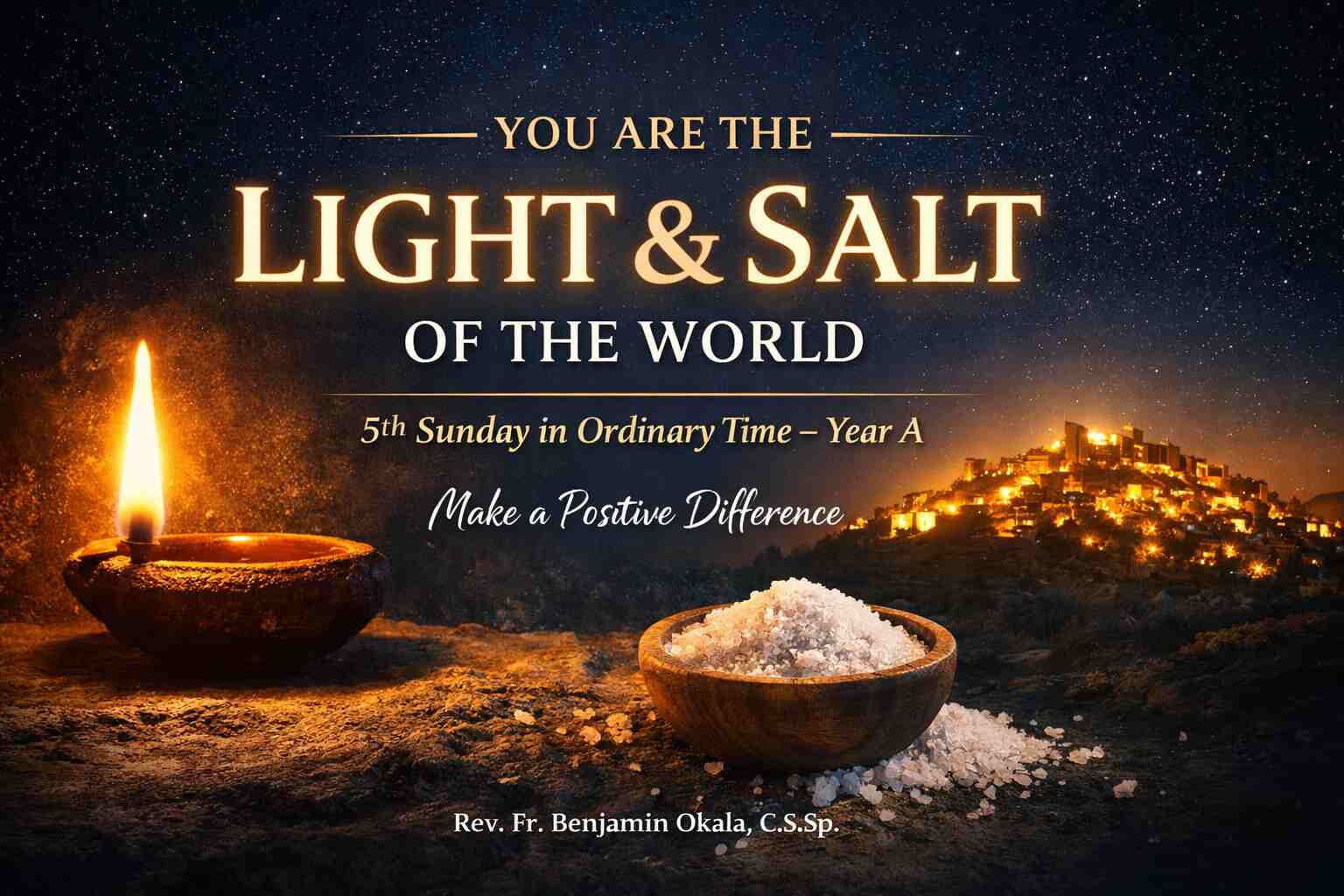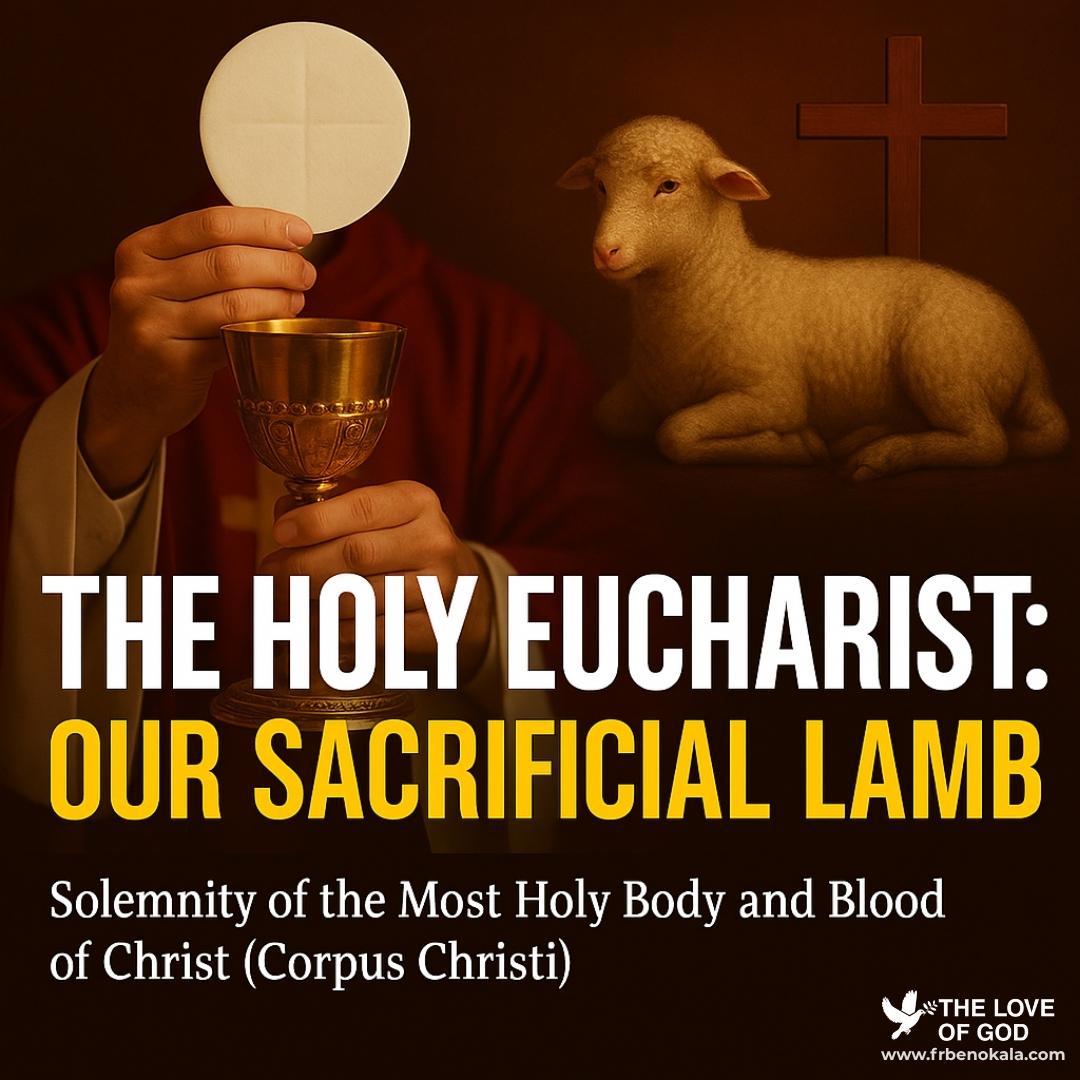YOU WILL CONQUER BY EMULATING MARY’S VIRTUES
1st Reading: Revelation 11:19; 12:1-6.10; 2nd Reading: 1 Corinthians 15:20-27; Gospel: Luke 1:39-56
Our world is a battlefield between good and evil, which seems to be only for the survival of the fittest, with many forces (physical & spiritual) engendered by the evil ones. This reality is evident in the lives of countless people today who struggle with socio-political instability, economic hardship, prejudice, injustice, tribalism, betrayal, sickness, and more. Many people are weighed down by these trials, losing hope and sinking into depression.
In the midst of such challenges, the pressing question arises: how do we survive these sufferings and not be crushed by them? The Solemnity of the Assumption offers us a divine answer. In Mary’s victory, we see the model of faith, perseverance, and holiness that leads to triumph over evil and entry into God’s glory.
Mary’s Unique Relationship with God
The Church celebrates today the completion of God’s triumph in the Woman (Blessed Virgin Mary), who was intimately connected with her Son (Jesus Christ) in the fulfilment of His salvific mission. Even though Mary was human, with flesh and blood as we are, she differs from us to a greater extent because of her honoured and most special relationship with God.
Her life was a constant reflection of God’s grace at work in humanity. From the moment of her conception to the day she was assumed into heaven, she lived in perfect harmony with God’s will. This intimate connection made her not only the Mother of Christ but also the spiritual mother of all believers, guiding them towards holiness.
Mary’s Triumph over the Dragon
In the first reading, St. John describes the beginning of the messianic era, in which the powers of evil, represented by a dragon, fought vehemently to thwart the victory of the Messiah. The dragon tried to devour the Woman (Blessed Virgin Mary), who was in her pangs of birth to deliver her Child (Jesus Christ), but failed. Thus, fulfilling His mission, the Child triumphantly and gloriously ascended to God’s Heavenly Throne (Acts 1:6-9).
This vision reveals not just a battle in heaven but the reality of the spiritual war we face here on earth. Mary’s steadfast faith and trust in God’s plan ensured that the enemy’s schemes could not prevail. Her victory, in union with Christ, assures us that those who stand with God will ultimately overcome the forces of darkness.
Immaculate Conception Highlights God’s Perfect Preparation
From the very first moment of her existence, God preserved Mary from original sin through the foreseen merits of Christ. This privilege, known as the Immaculate Conception, was not given for her sake alone but to prepare her for the sublime dignity of being Theotokos—the Mother of God.
It would certainly be against right reason to think that the All-Pure God, the Second Person of the Most Holy Trinity, could take flesh in a woman who was tainted by sin. Therefore, God exceptionally prepared Mary in her conception that He might one day be born of her in time. This preparation was not just a divine privilege but a profound sign of God’s plan to bring salvation to the world through a vessel of perfect purity.
The Dogma of the Assumption of the Blessed Virgin Mary
From the very beginning, the Church, through the inspiration of the Holy Spirit, holds that, having completed the course of her earthly life, Mary was assumed body and soul into heavenly glory, sharing in the resurrection of Christ. This was ratified as a dogma of the Church through the infallible declaration of Pope Pius XII (Munificentissimus Deus, 1950, no. 44).
Certainly, Christ, who never experienced bodily decay, could not allow His mother’s body—the sacred dwelling place that bore Him—to experience decay. Her Assumption is therefore a foretaste of the resurrection that awaits all the faithful. Yes, a sign that death does not have the final word for those who belong to Christ.
Mary and Elizabeth Empowered by the Holy Spirit
In the Gospel, filled with the Joy of the Holy Spirit, Mary sang the Magnificat, praising God for His divine favour upon her, lowly ones, and a revolutionary reversal of the socio-political status quo that would take place with the coming of God’s mercy in Christ. Surprisingly, Elizabeth was filled with the power of the Holy Spirit immediately after the Virgin Mary greeted her.
Consequently, the Holy Spirit inspired her to proclaim to Mary, “Blessed are you among women, and blessed is the fruit of your womb!” This shows that to encounter Mary is to experience the power of the Holy Spirit. Just as Christ told Philip, “Anyone who has seen me has seen the Father… (John 14:9),” so Mary, in an analogous way, could say, “Anyone who has seen me has seen the Holy Spirit.”
Mary as the Channel of the Holy Spirit
Mary’s mission is not only to attract us to the Holy Spirit, but in fact to attract Him to us. Hence, St. Louis de Montfort affirmed this and said, “It is Mary who can bring us into that deeper and more personal relationship with the Holy Spirit wherein we feel His effect in our lives.” Her life radiates the fruits and gifts of the Spirit, making her the perfect guide for our spiritual growth.
Undoubtedly, Mary reflects the image of the Holy Spirit, not only by her outer appearance but also by her inner virtues: profound humility, selfless love, lively faith, blind obedience, continual mental prayer, universal mortification, forgiving heart, surpassing purity, ardent charity, heroic patience, angelic sweetness, divine wisdom, etc. These virtues, which are worthy of emulation, were the weapons she used to conquer the dragon (evil). They remain powerful tools for every Christian in the spiritual battle.
Mary as the Model of Liberation and Faith
As the mother of Christ, Mary is the most perfect image of humanity’s liberation and the renewal of creation. Her pilgrimage of faith stands as a reference point for the Church and for all humanity. She walks with us in our trials, encouraging us to persevere in the fight between good and evil.
St. John Paul II affirms this in his encyclical: “The Church sees Mary in the saving mystery of Christ and in her own mystery, deeply rooted in humanity’s history and eternal vocation according to the providential plan which God has made for her from eternity. Mary is maternally present and sharing in the many complicated sufferings that today beset the lives of many people, … helping Christians in their constant struggle between good and evil, to ensure that they do not fall, or, if they have fallen, will rise again” (Redemptoris Mater, 1987, no. 52).
We are destined for eternal glory.
St. Paul assures us in the second reading that there is life beyond the grave. Christ’s passion, death, and resurrection have secured for us an eternal inheritance (Colossians 1:15-28). His victory over death has opened the way for our own resurrection at His coming (1 Corinthians 15:57).
Just as Mary was assumed body and soul into heaven, we too are destined for eternal glory—provided we follow her example of faith and holiness. The Assumption reminds us that heaven is not a distant dream but a promised reality for all who belong to Jesus Christ.
Conclusion and Prayer:
Dearly beloved, no matter the trials or sufferings you are facing now, the Assumption of Mary assures you that victory is certain, especially for those who trust in God. Mary’s virtues are your pathway to triumph; her intercession is your shield in battle. If you imitate her example, then you too will share in her glory.
Therefore, I pray that by the power of the Holy Spirit, whatever challenges you face today, you will overcome them with faith and hope in God. Through the intercession of the Blessed Virgin Mary, you shall surely triumph to the glory of God Almighty, through Jesus Christ our Lord, Amen.
Peace of Christ be with you…
Rev. Fr. Benjamin Okala, C.S.Sp.



